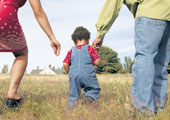 |
| Unsupported: A child separated from his or her parents may suffer irreparable psychological damage |
Daniel has only hazy memories of the day that his childhood effectively ended. He vaguely recalls, at the age of six, being taken to the head teacher’s office at school, of strangers arriving and taking him away in a car. He remembers sitting in a small room as a social worker asked him endless questions, of pleading for his mother but instead being taken that night to a Catholic children’s home where they put him in a bath and scrubbed him. He didn’t know it then, but he would not return home for another 10 years.
Though the details of these early events are fragmented in his mind, the memory of his tearful bewilderment and desperate longing to go home remains vivid. Today Daniel, a tall, pleasant but anxious young man of 22, is still uncomprehending and very angry. Incredibly, he was forced to live in care between the ages of 6 and 16, torn from his distraught parents, despite a judge ruling that there was no evidence that he was being abused.
But that is not the worst of what happened to his family. Thanks to the zealousness of a handful of social workers in Rochdale, Lancashire, UK, Daniel’s parents, Andrew and Beverley, were wrongly accused of involvement in a Satanic abuse network, a cult that supposedly involved ritualistic sex with minors, the slaughter of animals and the sacrifice of newborn babies. All four of their children were taken from them.
Three months later, in June 1990, 12 more children, all friends of Daniel, his sister and the family, were taken from their beds in traumatic morning raids, forced to endure intimate medical examinations and placed in care for months while investigations were conducted. During this time, bizarre though it seems, parents and children were kept apart because social workers suspected that they were communicating secretly with their children via coded signals and gestures.
Andrew and Beverley’s other sons, James and Matthew, then 3 and 4, spent seven years in a children’s home. Their daughter Julie, then 11, spent five years in care. Andrew and Beverley were allowed to see their children for just an hour a month, monitored by social workers.
Contact with Daniel was reduced gradually from an hour a month to an hour a year. Yet there was never any proof ? forensic, medical or otherwise ? to support claims of ritual abuse against any of the families.
The “evidence”? It was this: Daniel told his teacher that he was dreaming about ghosts ? apparently a mummy and daddy ghost and a baby ghost that died. He was at the time a withdrawn, disturbed child, often hiding under desks and being disruptive. His speech was poor for his age. This, says Beverley, led to him being bullied. The teacher was concerned enough to alert social services.
Unfortunately, for residents of the Langley council estate in Rochdale, this coincided with a particular climate in Britain in the late 1980s and early 1990s in which social workers were being trained to spot signs that a child was suffering ritual abuse. Social workers interpreted Daniel’s “ghosts” as being his abusers.
Now, for the first time, Daniel, his siblings and the other children whose lives were wrecked by the scandal can speak publicly about their experience after the BBC successfully challenged a longstanding injunction that gagged them and prevented the media from identifying the two key social workers involved in the case, Jill France and Susan Hammersley.
When I meet Daniel, he is in his parents’ house, drinking tea and struggling for words to describe how those lost years have scarred him. He finds talking about his upbringing harrowing. “I lack the confidence that everyone else seems to have,” he says. “I find it hard to strike up conversations with people. I’ve missed such a lot.” How would he describe his childhood in care? “Unhappy.”
The first time Daniel heard that suspected satanic abuse and his dreams were at the root of his family’s nightmare was when he was 16 and left foster care to return to his mother. “I couldn’t believe it,” he says. “I kept asking if I could go back home and they just said ‘No, it’s not safe for you,’ they didn’t explain more than that.”
He and Julie were placed in one children’s home, James and Matthew in another. Julie, now 26, winces at the memory of the medical examination she underwent in hospital to determine whether she had been sexually abused (it was negative). “I felt sick. Invaded,” she says. She, too, had no inkling of the satanic abuse allegations.
After a few years in the children’s home Daniel and Julie went to a foster home until, unable to bear it any longer, Julie walked out at 16 and went home to her parents. It felt, she says, the most right and natural thing in the world. But she still feels the stigma following her.
“Being a kid in care is hard,” she says. “When people at school asked why I was with foster parents I’d just say that my real parents were ill. “It makes you wonder about the way people look at you, what they think about you. I’m still not as confident as I should be; I tend to keep myself to myself. I don’t know if we’ll ever get over it.”
?The Times, London










